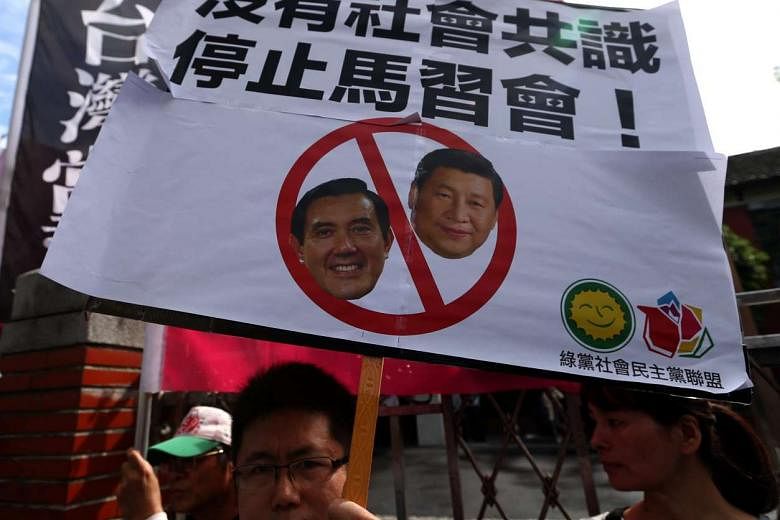TAIPEI (REUTERS) - Taiwan opposition leader and presidential frontrunner Tsai Ing-wen on Wednesday (Nov 4) lambasted the planned meeting between China's and Taiwan's leaders set for Saturday in Singapore.
Chinese President Xi Jinping will hold talks with Taiwanese counterpart Ma Ying-jeou on Saturday, the first meeting of leaders from the two rivals since the Chinese civil war ended in 1949.
"Last night, suddenly there was this news of the Ma-Xi meeting. I believe people across the country, like me, felt very surprised," Ms Tsai Ing-wen, chairwoman of the Democratic Progressive Party (DPP), said in prepared remarks to reporters and top party members. "A meeting of the leaders of the two sides across the strait is a great event, involving the dignity and national interests of Taiwan. But to let the people know in such a hasty and chaotic manner is damaging to Taiwan's democracy."
The party also said that cross-strait issues should not be used as an election ploy.
The talks come at a sensitive time for the island. Taiwan's presidential elections are set for Jan 16, amid growing anti-China sentiment among younger Taiwanese worried about Beijing's growing economic influence.
"Cross-strait issues have national interest at stake and should go beyond political considerations," said Mr Cheng Yun-peng, spokesman for the Democratic Progressive Party (DPP), which traditionally favours independence, and is loathed by China.
"They should not be used as part of election operations," Mr Cheng told a news conference. "However, the current period coincides with Taiwan's election and President Ma picks this sensitive time for meetings. How can people not think of this as a political operation intended to affect the election?"
Opinion polls show Mr Ma's ruling Nationalists are trailing behind the DPP in the runup to the January vote for a new president and legislature.
Mr Ma, who is set to step down next year due to term limits, has made improving economic links with China a key policy since he took office in 2008. He has signed a series of landmark business and tourism deals, though there has been no progress in resolving their political differences.
Chiang Kai-shek's Nationalists fled to Taiwan following their defeat by Mao Zedong's Communists at the end of the Chinese civil war. Since then Taiwan has been self-ruled. But Beijing still regards Taiwan as part of China.
China deems the island a breakaway province to be taken back, by force if necessary, particularly if it makes moves toward independence.
No peace treaty has ever been signed to formally end the civil war.

